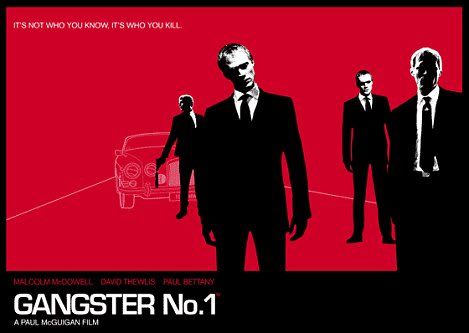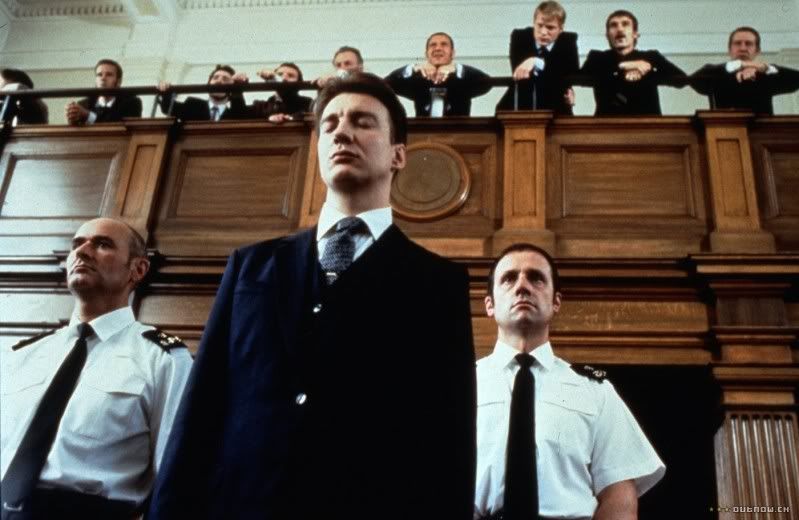
[audio:http://www.blueinkalchemy.com/uploads/gangster_no_1.mp3]
‘Crime drama’ is a pretty broad spectrum for stories. Some are from the perspective of those on the people’s side of the law, following detectives and prosecutors in their pursuit of justice. Others give us the point of view of the individual criminal, from the ones trying to rise above a life of crime to those wallowing in it. They range from gritty realism to stylized flights of fancy, but there’s something about Gangster No. 1 that refuses to be pinned down to any side of the story save that of our protagonist.

Said protagonist remains nameless throughout the story much like his cousin in Matthew Vaughn’s seminal and stylish Layer Cake, and is recruited back in 1968 by up-and-coming crime boss Freddie Mays. Our hero looks up to Freddie in a big way, but when it seems Freddie has more affection of a nightclub singer than his new right-hand man, jealousy rears its ugly head. Circumstances fall together for the young gangster to get Freddie out of his way and become the big dog in the London yards, and he rules over a mighty criminal empire until, over 30 years later, Freddie returns from his imprisonment. A reunion is clearly in order.
One of the best things Gangster No. 1 has going for it is the clear influence of Stanley Kubrick’s A Clockwork Orange. With Malcolm McDowell as the older iteration of the Gangster, and Paul Bettany excellently pulling off the glower from behind lowered eyebrows that Malcolm himself made famous, we’re reminded quite clearly of the film that gave us ‘a bit of the old ultra-violence’. And this movie certainly doesn’t shrink from the heavy stuff. Indeed, one of the best sequences in it involves a particularly brutal and thorough murder from the perspective of the victim, which tells us much more about the Gangster than any words ever could.

“Totally cool with you dating that chick, bro.”
This is a man driven mad with desires. He came from nowhere and wanted everything he saw. He didn’t just look up to Freddie Mays, he wanted to be Freddie Mays. More than once, we get the impression that the Gangster is struggling with feelings of romantic love for Mays, while at the same time he longs to oust Mays and take his place. This is why he seems so tortured when he’s taking his time to kill the rival crime lord who set about assassinating Freddie: the rival cause Freddie pain, he beat the Gangster to the punch, and he doesn’t dress or live anywhere near as well. The Gangster is out to prove his worth, that he is better than any other lawbreaker running around London, and he’ll leave a trail of bloody, broken bodies to do it without a shred of guilt or even a moment’s second thought.
It must be said that without McDowell’s sour, profanity-laced narration and Bettany’s silent, edgy intensity, this character study would fall completely flat. But thanks to the efforts of these two actors the movie functions quite well for what it is. The best scene is probably between Bettany and Saffron Burrows, the girl who “stole” Freddie from the Gangster. When she crosses the line and spits in the face of this cold-blooded, half-mad killer, Bettany’s face gives us an unflinching look at the anger and insanity writhing around in this character. Yet, he composes himself, without breaking eye contact, manages to smile and conveys wishes that would seem genuine, apologetic and heartfelt if it weren’t for the icy rage we’d seen moments ago. It’s a fantastic bit of acting that stands out among the rest of the film’s scenes.

Why is Professor Lupin being such a complete jerk?
The problems with Gangster No. 1 come down to tone and pacing. It never seems to decide for certain if it wants to be a mix of character drama and comedy like a Guy Ritchie film or a pure hard-nosed crime tragedy like Scarface. Elements of both are clearly present along with the aforementioned Clockwork Orange but it feels a bit like director Paul McGuigan went to a buffet where all of these options were available and tried to cram his plate with as much as he could from each one. It never becomes an actual mess, but also never finds its own voice amongst these influences. It also seems to accelerate a bit too much in places, as if once past the major turning points in the Gangster’s formative years it just wants to get us to the end. As for the ending, I won’t give anything away, but part of me was slightly unsatisfied with its neatness. Call me crazy, but I was expecting things to be a bit messier.
The director’s later work, Lucky Number Slevin and Push, had a better time with tone and pace, but Gangster No. 1 still gives us clean shots of excellent actors working with good story elements. I do feel there are better movies I’ve mentioned that can satisfy a craving for gritty criminal comedy or unflinching views into the underworld, and our villain protagonist doesn’t quite have the necessary pathos for us to be completely won over by him. He comes close, especially when we see how much unresolved emotion there is inside of him for Freddie, but it feels like too little too late. A little more time, perhaps elements of holding onto that duality of admiration and jealous, would have fleshed it out more and maybe left the ending a bit more satisfying for me. It never quite rises to the point of being more than the sum of its parts, but some of those parts are excellent enough for me to recommend Gangster No. 1 as an addition to any crime, noir or character-driven Netflix queue selection.
Especially if you’re a fan of British slang, or those mirror dresses club girls wore back in the 60s. Pretty groovy stuff.
Josh Loomis can’t always make it to the local megaplex, and thus must turn to alternative forms of cinematic entertainment. There might not be overpriced soda pop & over-buttered popcorn, and it’s unclear if this week’s film came in the mail or was delivered via the dark & mysterious tubes of the Internet. Only one thing is certain… IT CAME FROM NETFLIX.



Leave a Reply